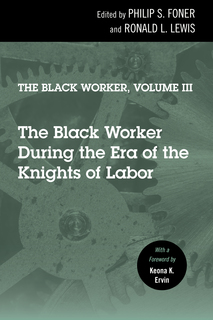The Black Worker, Volume 3
The Black Worker During the Era of the Knights of Labor
Edited by Philip S. Foner and Ronald L. Lewis
With a Foreword by Keona K. Ervin
Published over the course of six years, the eight volumes of The Black Worker: From Colonial Times to the Present contain a voluminous amount of archival material. Through their publication, Philip S. Foner, Ronald L. Lewis, and Robert Cvornyek birthed a new generation of Black labor history scholarship. Theirs was big, synthesis-style, social, political, intellectual, and institutional history that tried to capture as broadly as possible the patterns, trends, and themes that made race and class, and the Black labor experience, in particular, significant, shaping forces in United States history. With its compelling perspective on the salience of Black labor history along with its sheer breadth and depth, The Black Worker was and is required reading for students of labor and working-class history and African American history.
Prior to publication of The Black Worker, Black workers were largely absent from or mere footnotes in established histories; dominant narratives presented a “house of labor” occupied primarily if not exclusively by white, male, industrial workers. These accounts paid little attention to unions’ widespread practice of racial exclusion and discrimination, nor to attempts by Black workers to organize their own labor. Through its documentation of these practices, The Black Worker in no small part helped to bring about acknowledgment of these practices and the start of inclusiveness.
Inserting the voices and actions of the marginal into the canon of history was of monumental importance. By incorporating new voices into the standard chronology of American labor history, The Black Worker helped to push the field to revise its core keywords and conceptual underpinnings.
Table of Contents
Metadata
- isbn9781439917701
- publisherTemple University Press
- publisher placePhiladelphia, PA
- restrictionsCC-BY-NC-ND
- rightsCopyright © 1978 by Temple University—Of The Commonwealth System of Higher Education
First published 1978. Reissued 2019.


